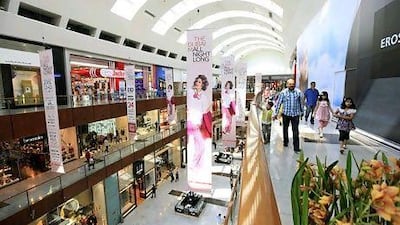Retailers will be counting their revenues today after a bumper weekend of 24-hour shopping.
The Eid Al Adha holiday shopping spree, for which malls drafted in extra staff to cope with the demand, highlights the continued rise in consumer spending across the Emirates.
Initial reports from stores show substantial rises in sales at outlets participating in the Eid round-the-clock shopping event as visitors flocked from elsewhere in the UAE and abroad.
"We saw over 20 per cent growth [on Eid last year]," said Ishwar Chugani, the executive director of Giordano, the clothing retailer.
"The malls that had a lot more activities and were [open] 24 hours showed the most growth."
Pure Gold, a jeweller based in the UAE, also recorded a noticeable rise in sales.
"We got additional sales of 15 to 17 per cent in selected malls [compared to last Eid], like the Mall of the Emirates," said Firoz Merchant, the chain's chairman and founder.
But even malls that did not take part in the 24-hour event welcomed more visitors, such as BurJuman, a luxury shopping mall in Dubai, which opened four hours longer over the weekend.
"We don't have enough entertainment to keep people 24 hours, like cinemas. But the experience was great. And I think we made a good decision from selling from 10pm until 2am," said Eisa Adam Ibrahim, the mall's general manager. "People were coming from not only Dubai but all over the region, Saudi Arabia and Oman."
Despite the rise in shopping last weekend and over the past several months, price rises across the board have remained surprisingly subdued, according to official estimates.
Headline inflation edged up only slightly to 1.1 per cent last month compared with a year earlier, against a backdrop of a strong rebound in property prices and rising tourist numbers.
"We might get some short-lived boost in inflation because of higher agricultural prices for example, but overall we think it is a downward trend, not an upward one," said Said Hirsh, an economist at Capital Economics in London.
"There will be some pressure on food inflation, but if it starts creeping up I would expect to see a positive response quite quickly."
The research company believes Arabian Gulf economies are slowing their pace of growth, which is helping to ease inflationary pressures and in turn boosting household incomes. The trend is most visible in Saudi Arabia, where headline inflation has been falling for the past seven months and is now at a three-year low even after a massive government stimulus package.
While official data shows only a small rise in consumer prices, an analysis by The National revealed a significant increase in the price of the average weekly shop in the Emirates - with some branded goods rising by as much as 10 per cent since the beginning of the year.
The Ministry of Economy this year introduced an online monitoring system to track prices on a basket of 200 goods on a weekly basis at major supermarkets. It has already frozen the cost of some 1,600 staple foods until the end of the year in a bid to keep a lid on inflation.
Officials are monitoring prices closely at a time of rising retail spending that has benefited the glitzy malls of Dubai and drawn visitors from across the region.
The Mall of the Emirates was last week named one of the world's most profitable malls by the International Council of Shopping Centres. It was found to be almost three times more profitable than the industry average around the world.
Emaar, the owner of Dubai Mall, said revenues from its shopping malls and hotels had surged 17 per cent in the first nine months of this year compared with a year earlier.
Dubai Mall has welcomed more than 44.5 million visitors from January to September, which equates to an increase of about 15 per cent compared with a year ago.


